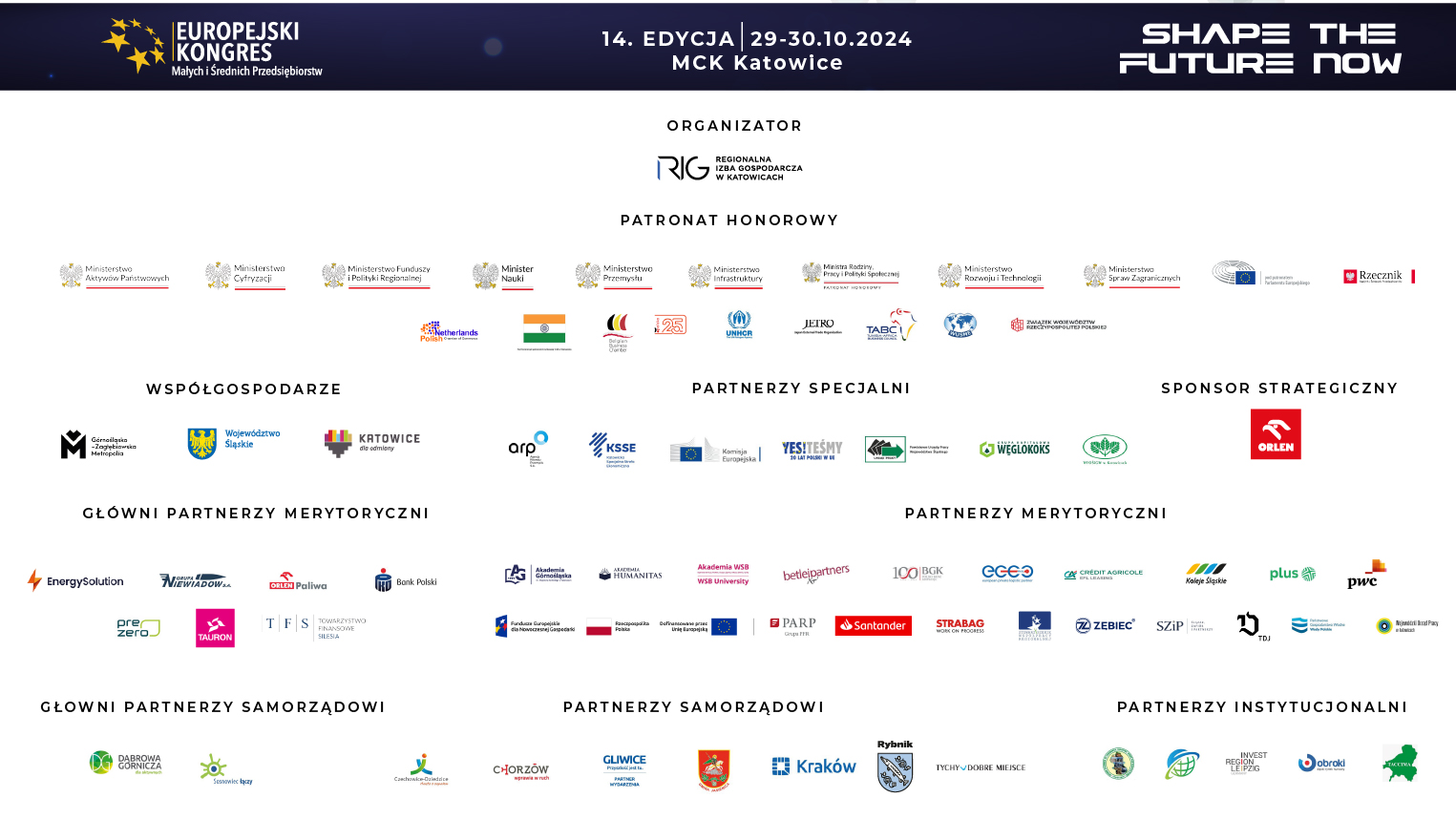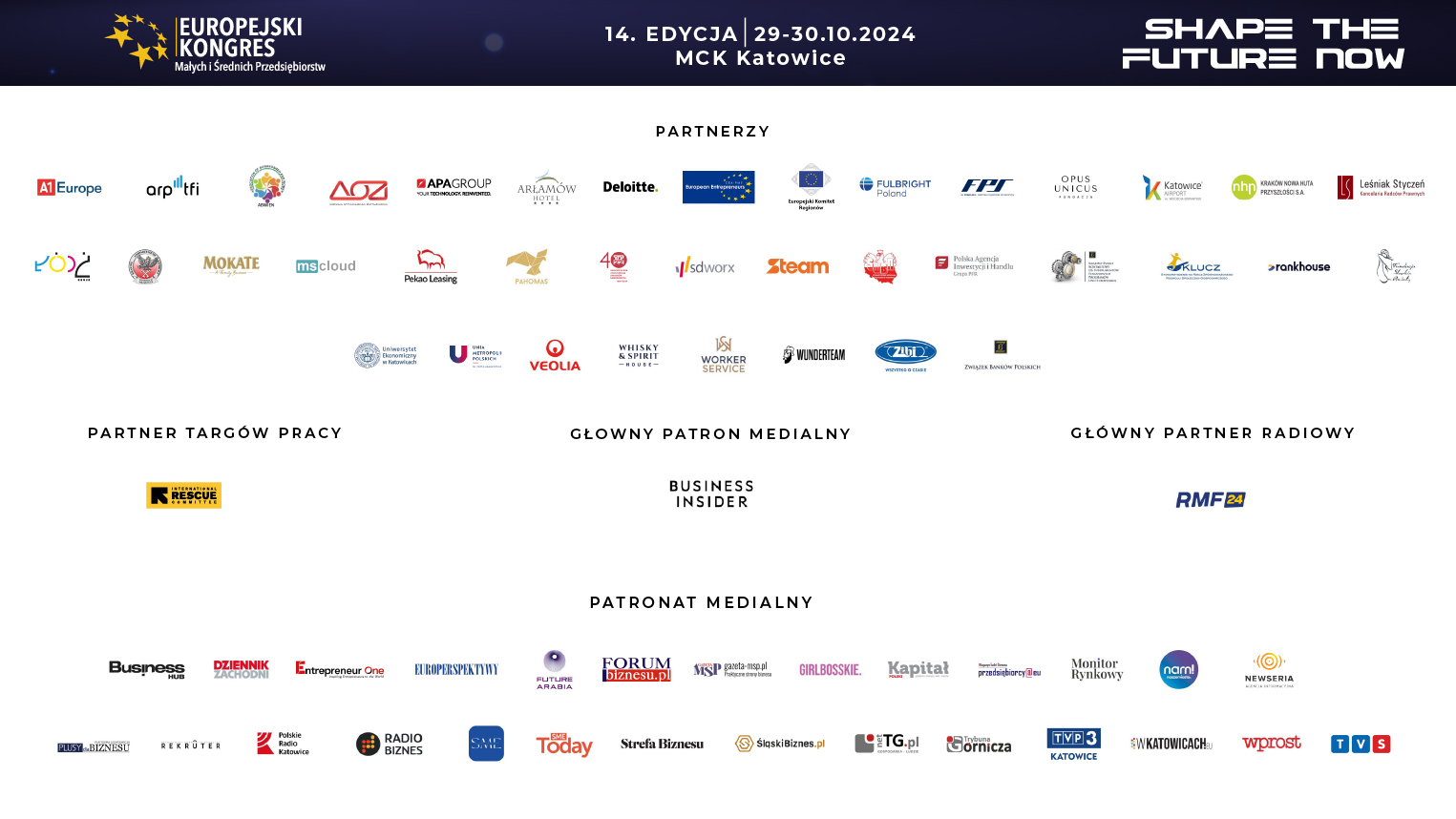.jpg)
Second day of shaping the future at the European SME Congress
The Katowice International Congress Center hosted further panel discussions on the second day of the 14th ECSME, which included such issues as “Smart City for Business,” “The Company is People,” “Marketing and Sales,” and “Shape the Future Now.”
Smart City for business
On the second day of the congress, special attention was paid to the smart city concept and its key role in the development of local businesses and improving the quality of life of residents. During panels entitled “Why does a city need to be smart to be an attractive place to live and work?” and “Katowice Gaming and Technology HUB: The city as a catalyst - cooperation between local and international entrepreneurs in the digital age,” experts stressed the importance of combining the efforts of local governments with the innovation of the private sector.
– Without cooperation between local government and business, no city will be smart. In addition to the actions of the city, it is the entrepreneurs who implement innovative solutions - noted Ewa Lipka, Vice President of the Board of the Katowice Special Economic Zone S.A.. She stressed that technological innovations, such as smart traffic management systems, efficient energy management or projects that build green infrastructure, can only become a reality through the synergy of the city and business.
Damian Kołakowski, Deputy Director of the Department of Infrastructure and Environment at the GZM Metropolis, added that local governments are in the “eye of the cyclone” of change. - “All we have to do is hear slogans such as ‘15-minute city,’ ‘green infrastructure’ or ‘closed-loop economy,’ and we know that this is largely happening at the local government level,” he said. He stressed that local governments have a responsibility not only to adapt cities to new environmental and technological standards, but also to set trends that shape local working and living environments.
Speakers also pointed to key initiatives such as the Katowice Gaming and Technology HUB, which is designed to provide a platform for local and international new technology entrepreneurs to work together. The project aims to attract companies specializing in gaming and the IT sector to create a friendly ecosystem for work and innovation.
Challenges of implementing new technologies and the impact on the labor market
During the panels “Education and Development of Digital Competencies: What digital competencies are necessary for today's leaders and employees?”, ‘Silesian Labor Market - New Challenges’ and ‘HR 4.0 New Challenges and Trends’ discussed how the implementation of new technologies is shaping the labor market and what digital competencies are key today. Participants agreed that the dynamic development of technology requires both the preparation of employees and the flexibility of leaders.
Mirosław Ruszkiewicz, Chairman of the Convention of Directors of District Labor Offices of the Silesian Voivodeship, stressed the flexibility and adaptability of labor offices. - We, as directors and employees of the Labor Office, are special services. And we always manage,” he said. In his view, adequate support from public institutions is crucial, especially in the context of new challenges, such as digital transformation and the changing needs of the labor market.
Danuta Kamińska, Vice-Chairwoman of the Board of Directors of the GZM Metropolis, presented the Info GZM tool, which aggregates data on all 41 cities in the region, making it easier for entrepreneurs to access local information. - Unfortunately, CSO data only collects data on a national scale, on the scale of provinces, municipalities and counties. That's why we created the Info GZM database,” she said, pointing out that access to detailed, local data allows entrepreneurs to better plan their activities and adapt their strategies to the specifics of the region.
During the discussion, Li Andersson, Chairwoman of the European Parliament's Committee on Employment and Social Affairs, reminded the audience that technologies in themselves are neither good nor bad. - Technological development cannot be stopped. History teaches us that no technology is bad or good. It is the way we use it that can be bad or good. The same is true for AI and the job market - she noted, emphasizing the need for a wise and ethical approach to artificial intelligence, especially in the context of its impact on employment.
Mario Nava, Director General of the EC Directorate General for Employment, Social Affairs and Inclusion, noted that Poland stands out in Europe in terms of investment in Community programs to raise the competencies of employees. - Of all European companies that benefit from Community support dedicated to raising employee competencies, as many as 10% are from Poland, he informed, which testifies to the growing awareness of entrepreneurs about the role of competence development in building competitiveness.
In turn, Mariusz Mandzijevich of ORLEN highlighted the challenges facing leaders. Faced with increasing demands, especially from younger generations, leaders must not only keep up with technological changes, but also set an example for their teams. - We paid particular attention to the difficult role of the leader, who, in the face of overwhelming responsibilities, must set an example and set the course for teams, he said, pointing to the need to develop leadership competencies and build commitment in the digital age.
Marketing iand new technologies in new everyday work
During the panels “Specifics of sports sponsorship - challenges and benefits for both sides” and “Marketing 2077, or let's talk about the future,” participants addressed topics related to the evolution of marketing and the specific benefits and challenges of sports sponsorship. In the context of marketing of the future, experts unanimously agreed that technologies that will allow better personalization of content and real-time interaction with customers will be key. This will enable brands to offer customers more personalized experiences that meet their individual needs.
Sports sponsorship, as a form of marketing, is an increasingly sophisticated field in which involvement is no longer limited to financial support. Brands working with sports teams are becoming partners, building relationships that engage not only the players, but also the fans. Through this cooperation, they can strengthen their values and increase audience loyalty. The panelists stressed that for companies, sports sponsorship is first and foremost a way to build an authentic image through a direct relationship with fans.
In the context of the digitization of businesses and the use of digital data, Dr. Artur Pollak, CEO of APA Group, shared practical tips for the SME sector. - Let's be bold and take advantage of the possibilities of artificial intelligence. It's a tool with which we can not only improve the efficiency of our work, but also effectively build comfort and well-being,” he stressed, pointing out the huge potential of AI in optimizing processes and creating competitive advantages. Digitalization enables companies to better manage resources, respond quickly to market changes and adjust business strategy based on specific data.
The keynote of the congress: „Shape the future now”
This year's European Congress of Small and Medium-sized Companies, held under the slogan “Shape the future now,” encouraged participants to actively shape the economic future today. Michał Dąbrowski, Chairman of the Board of the Industrial Development Agency S.A., pointed out that in the face of dynamic global changes, the slogan could also be interpreted as “Shake the Future.” - It seems that one could also say Shake the Future, because in fact this global economy, especially today, has taken on a completely different dimension,” he noted. He stressed that the challenges facing the global economy require businesses and local governments to be flexible and ready to respond quickly to changes.
Hanna Zdanowska, Mayor of Łódź and Member of the European Committee of the Regions, mentioned the challenges Lodz faced in the past to build new opportunities for the young generations. - Łódź, after the collapse of the textile industry, did not provide any development opportunities for young people. Today, thanks to the efforts made in Łóź, we already have a positive balance in the balance of young people arriving/leaving,” she said. In her opinion, the city's transformation has become possible thanks to long-term efforts to adapt the labor market and education to modern standards and the needs of the young generation, which is now increasingly choosing Lodz as a place for professional development.
Arkadiusz Chęciński, Mayor of the City of Sosnowiec, in his speech at the Congress stressed that one of the main goals is to create conditions in which valuable and ambitious young people will not leave Poland. - Our goal is also to create conditions in which young, talented people, winning international successes, will want to develop their careers in the country,” he said.
Mr. Chęciński expressed his conviction that initiatives such as the European Congress of Small and Medium-Sized Companies can significantly contribute to building a friendly environment for the development of Polish businesses.
Security and defense - the foundations of state resilience
One of the key topics of this year's Congress was security and defense issues, which are becoming particularly important in these times. Wojciech Saługa, Marshal of the Silesian Voivodeship, pointed out that building the country's resilience cannot be limited to military action alone. - To build state resilience, one needs not only the military itself, but also the involvement of authorities at all levels, logistics and infrastructure, and many other factors, he said.
Marshal Saługa stressed that the creation of an effective defense system requires close cooperation between all levels of government and society. Only a well-organized structure that takes into account both resources and logistics in emergency situations can ensure effective protection of citizens. - We need to develop a transparent, comprehensive system that shows where the stores are and what resources are needed in an emergency, rather than buying mineral water and shovels at one point, which ultimately have nowhere to be stored, he explained. Such a strategy will prevent inefficient management of resources and allow rapid response in the face of emergencies.
The discussion on security showed that building resilience is a complex process that requires planning and cooperation of all social actors.

